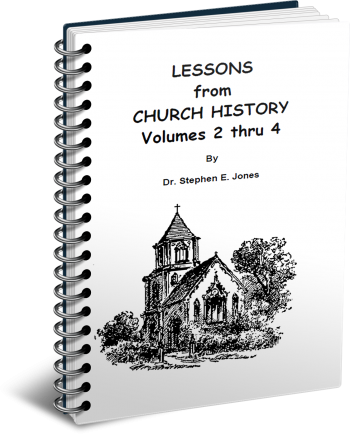Latest Posts
View the latest posts in an easy-to-read list format, with filtering options.

Volumes 2-4. This is the history of the Church from the Roman War (66-73 A.D.) to Constantine and the Council of Nicea in 325 A.D. with lessons to be learned from it.
Category - History and Prophecy

One of the most influential and important Christian writers of the second century was Justin, the first Christian philosopher, or philosophic theologian.
Justin was born about the turn of the second century in the Palestinian town which is today called Nablus, which is often in the news. But in the second century it was a new town near Sychar in Samaria called Flavia Neapolis, named after the Emperor Flavius Vespasian. It was a Greco-Roman colony built shortly after the destruction of Jerusalem around 72 A.D. Justin's parents were no doubt colonizers to the new city, for his grandfather's name was Greek and his father's was Latin.
In his early life he had a great desire to learn Truth, and so he sought it among the philosophers. First, he went to a Stoic, but found him to be an agnostic that did not believe it was possible to find the knowledge of God. In fact, after a season of study under him, he found that he had learned nothing about God and realized that this philosopher had no knowledge of Him.
Next he went to a Peripatetic—that is, a philosopher from the school of Aristotle (who had been the tutor of Alexander the Great in the fourth century B.C. before his conquests). The Peripatetic school was called the Lyceum in Athens, which Aristotle founded in 325 B.C. after Alexander left the country to conquer the world. Aristotle's method was to observe nature and then draw conclusions to prove higher truth. He was perhaps the father of modern science.
The Peripatetic philosopher that Justin met, however, was more interested in obtaining a good fee than in teaching Truth. In those days, asking a fee proved that he was not a real philosopher. So Justin went next to a celebrated Pythagorean who appeared well educated. But he insisted that Justin first take courses in music, astronomy, and geometry before teaching him the higher truths.
When Justin found a disciple of Plato, he thought at last that he had found the right philosophy. While studying Platonism, he heard the teachers berate the Christians for their teachings, but he also observed their fearless courage in the face of death in the times of persecution. Then it happened that he met a humble, venerable, unknown Christian while walking near the sea shore. This Christian pointed out that the Hebrew prophets antedated the philosophers by many centuries and that they had prophesied of things that were to come. These prophets were not philosophers depending upon reason, but were witnesses to truth by revelation.
The knowledge of God, the old man said, could not be discovered by human knowledge, but needed inspiration by the Holy Spirit to reveal Him. Whoever this mysterious old man was, he must have been a student of the Apostle Paul, who himself had discussed the basis of the knowledge of God in his first letter to the Corinthians. Paul said that true knowledge of God was foolishness to the Greeks, because they depended upon the soul for such revelation. The soulish [pseukikos] “man” within us cannot receive the things of the Spirit (1 Cor. 2:14). The true knowledge of God comes only through one's spirit, for that “spiritual man” within is our link and contact with the Holy Spirit of God. That spiritual man is the mind of Christ and functions by direct revelation, not by the reasonings of the soulish man (i.e., the natural mind).
In Justin's Dialogue with Trypho, he gives an account of his conversation with the old man in ch. III,
“Is there a knowledge which affords understanding of human and divine things, and then a thorough acquaintance with the divinity and the righteousness of them?”
“Assuredly,” I [Justin] replied.
“Now if one were to tell you that there exists in India an animal with a nature unlike all others. . . you would not know it before you saw it; but neither would you be competent to give any account of it, unless you should hear from one who had seen it.”
“Certainly not,” I said.
“How, then, should the philosophers judge correctly about God or speak with any truth, when they have no knowledge of Him, having neither seen Him at any time, nor heard Him?”
“But father, the Deity cannot be seen merely by the eyes, as other living beings can, but is discernible to the mind alone, as Plato says; and I believe him.”
“Is there then such and so great power in our mind? Or can a man not perceive by sense sooner? Will the mind of man see God at any time, if it is uninstructed by the Holy Spirit?”
The discussion continued, wherein the old man showed Justin that the philosophers could not give anyone a revelation of God. Justin's response, then, came in ch. VIII,
“Should anyone, then, employ a teacher, I say, or whence may anyone be helped, if not even in them there is truth?”
(The old man replied) “There existed, long before this time, certain men more ancient than all those who are esteemed philosophers, both righteous and beloved by God, who spoke by the Divine Spirit, and foretold events which would take place, and which are now taking place. They are called prophets. These alone both saw and announced the truth to men, neither reverencing nor fearing any man, not influenced by a desire for glory, but speaking those things alone which they saw and which they heard, being filled with the Holy Spirit.”
And so the old man explained to Justin that the prophets had foretold of the coming of Christ and explained how Christ had fulfilled those prophecies. When the old man departed, Justin took his advice and began to read the Old Testament prophecies, along with the Gospels which, by the second century, were already well established in the Church after decades of use. Being convinced that this was the Truth for which he had been searching, he found Christian brethren from whom he received further instruction. This was how Justin came to be converted to Christ and thereafter devoted himself to the spread of its teachings.
There is no evidence that Justin ever received ordination, but as a lay-preacher and writer, he accomplished far more than any other bishop or presbyter of his day. In order to be more readily heard in philosophic discussions, he retained his philosopher's cloak, the pallium, a threadbare robe that was an emblem of an austere life of study. The pallium was later adopted by the monks in Christianity.
Justin spent some time in Rome, where he discoursed with Marcion the heretic. In Ephesus he conversed extensively with Trypho (or Tryphon), the Jew who had been a leader in the disastrous Bar-Cochba revolt. Eusebius calls Trypho “the most distinguished among the Hebrews of his day,” but he was not a fanatical Pharisee. He was both tolerant and courteous and, after his discourse with Justin, was able to call him a friend. After discussing the Jewish persecutions which had continued to their time, Justin says,
“Yet we do not hate you or those who, by your means, have conceived such prejudices against us; but we pray that even now all of you may repent and obtain mercy from God, the compassionate and long-suffering Father of all.” (ch. CVIII)
It is unfortunate that later Christians took a very different view when power came to them to return good for evil.
Returning to Rome a second time, Justin was opposed by the Cynic philosopher, Crescens, who resented him because Justin had convicted him of opposing Christianity with complete ignorance of Christ and Christian teaching. At the instigation of Crescens, Justin and six other Christians were brought before the tribunal of Rusticus, the prefect of the city, where they gave fearless testimony of Christ. This gave Justin and his friends opportunity to prove their convictions, and they refused to sacrifice to Caesar and the gods. They were beheaded about the year 166 A.D.